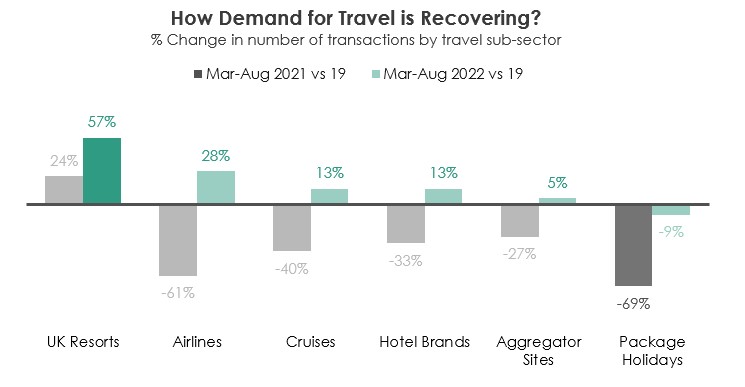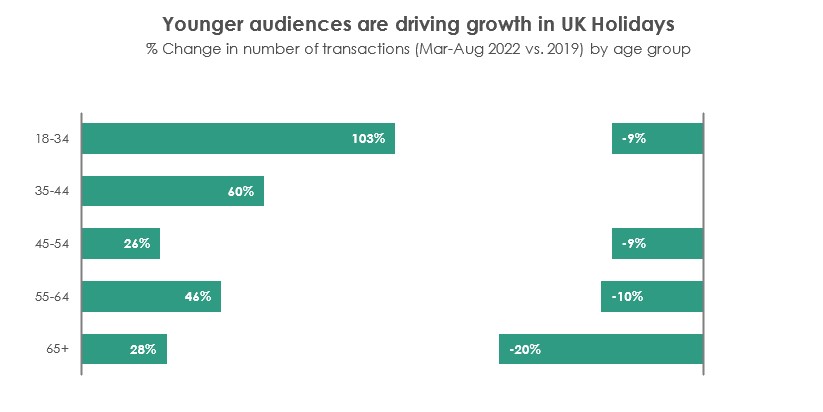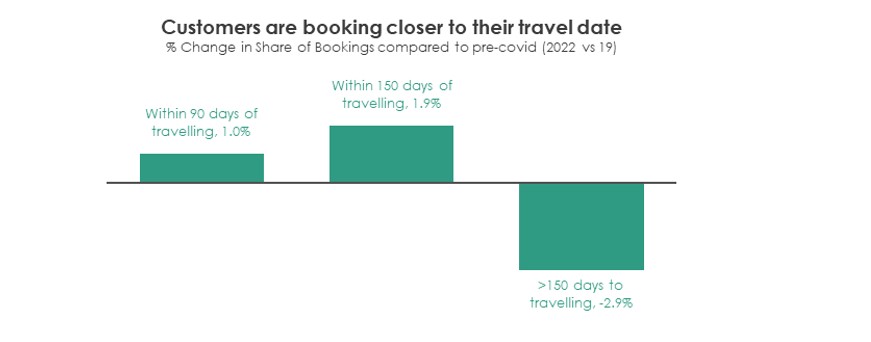This summer we saw newspaper headlines covering the chaos at airports as holidaymakers tried to get away. Now that we've put summer behind us we're sharing our reflections on how consumers behaved across the summer holiday period, and our projections for what's going to happen next.
Despite the travel chaos demand for travel has not diminished. According to Reward’s payments dataset of over 10million UK cardholders, bookings have picked up as consumers are making up for time lost during the pandemic.
How Has Consumer Behaviour Since The Pandemic Changed?

As the chart above shows consumers are choosing a different type of holiday compared to pre-pandemic trends.UK destinations had an outstanding year last year, as people opted for domestic holidays due to covid-related travel restrictions.
This trend has continued into 2022, with bookings 57% higher than in 2019, and if we see demand stay the same into next year this could signal a golden period for UK tourism. This has been at the expense of package holiday bookings, which have
declined 69% vs. 2019, with customers perhaps opting for more independent travel or greater flexibility in their booking options.
Staying Closer To Home
The trend towards “staycations” is being driven by less affluent customer segments (C2DE customers), perhaps due to reduced budgets caused by the cost-of-living crisis. Conversely, the decline in package holidays is more prominent amongst more affluent customers.
Perhaps more surprisingly, growth in UK holiday bookings is fastest amongst the younger demographic, with bookings for 18-34 year olds more than double what they were in 2019.
Clearly, this younger, less affluent customer group should be a core target audience for UK tourism brands.

Later Bookings
Finally, for those still seeking to travel abroad, the summer of travel chaos in combination with a Covid hangover have made some more cautious, with more customers booking closer to their travel date.

For travel brands, this will all cause some re-consideration of when and who they target their marketing budgets at. Rather than focusing on the traditional January peak, budgets will need to be phased more evenly across the year, with marketing teams setup in an agile way to respond to sudden shifts in demand caused by external factors.
What’s Next?
With the peak season for tourism now behind us, attention turns to next year, by which point energy prices, interest rates and inflation may have increased even further. It will be interesting to see whether the resilience of the British public and their desire to get away remains.
If discretionary spend is squeezed further and demand does decrease, it will be important for brands to drive as much efficiency from their marketing budgets as possible.
Understanding your consumers buying behaviour and getting those who are planning on travelling to spend with your brand will be key.
To find out more about how Reward can help you shape your marketing activity and achieve your objectives leave us a message in the comment box and we'll get in touch.